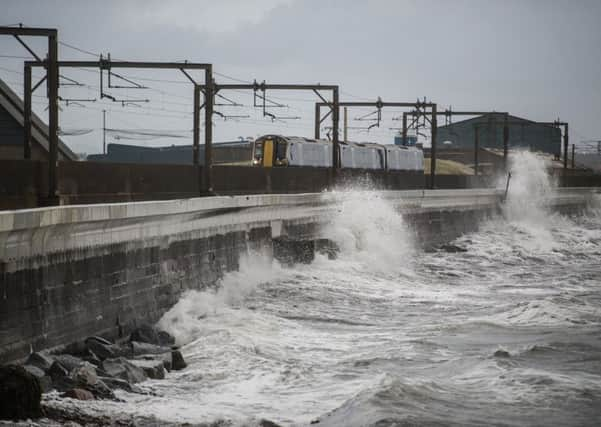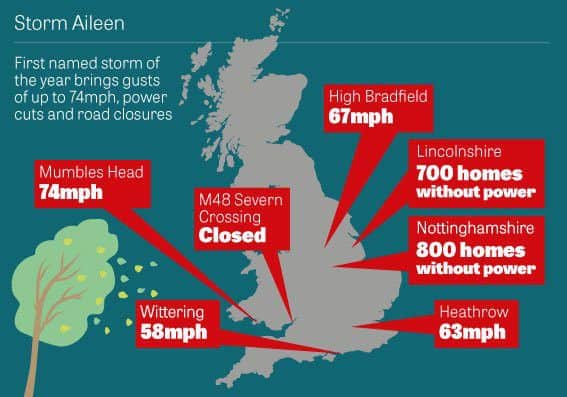Storm Aileen: The damage done by the first storm of the year, and what to expect next


The first named storm of the year hit the country overnight and will continue through Wednesday morning, bringing gusts of up to 75mph.
How long will it last?
Weather experts have said that the winds will ease off but will remain strong today.


Advertisement
Hide AdAdvertisement
Hide AdAs Storm Aileen clears out eastwards into the North Sea, the UK will be left with cool, showery conditions by the end of the week and into the weekend, Met Office forecasters said.
A spokesman said: “The last of the overnight heavy rain and gales should quickly clear to the east. All parts will then see sunshine and heavy, blustery showers with hail and thunder likely. Staying breezy for much of the day and feeling cool.”
Where is affected?
Storm Aileen has been moving across the north of England and Scotland early on Wednesday morning before moving out into the North Sea.


But the edge of the storm is still bringing with it heavy rain for the northern parts of the United Kingdom.
Advertisement
Hide AdAdvertisement
Hide AdAn Amber National Severe Weather Warning was put in place, with warnings of gusts of 55-65 mph in particular across parts of Cheshire, Lancashire, Derbyshire, Yorkshire, Nottinghamshire and Lincolnshire.
Motorists were also facing road closures up and down the country due to fallen trees. Police forces in Staffordshire, Cheshire and Gloucestershire all reported trees being blown over by the winds overnight.
Advice for commuters
Richard Leonard, road safety spokesperson at Highways England, said: “We’re encouraging drivers to check the latest weather and travel conditions before setting off on journeys. In high winds, there’s a particular risk to lorries, caravans and motorbikes so we’d advise drivers of these vehicles to slow down and avoid using exposed sections of road if possible.”
Further information can be found by visiting www.highways.gov.uk/traffic or calling the Highways England Information Line on 0300 123 5000.
Advertisement
Hide AdAdvertisement
Hide AdIn north-east Scotland, police urged motorists to give themselves plenty of time for their journey and to be wary of standing water and localised flash flooding overnight.
Rail commuters are also facing slower journeys and cancellations.
On its website, National Rail said falling trees and large branches, power cuts and debris blown onto the tracks were causing problems.
Affected services include Arriva Trains Wales, Chiltern Railways, East Midlands Trains, Greater Anglia, London Midland, Merseyrail, Northern, South Western Railway, Southern and TransPennine Express.
For more information, visit www.nationalrail.co.uk
Advertisement
Hide AdAdvertisement
Hide AdFor flight delays and cancellations, check with your airline and the airport you are travelling from.
How long until the next major storm?
Britain is set to be hit by three tropical storms this autumn.
The full list for this year’s storms are: Aileen, Brian, Caroline, Dylan, Eleanor, Fionn, Georgina, Hector, Iona, James, Karen, Larry, Maeve, Niall, Octavia, Paul, Rebecca, Simon, Tali, Victor, Winifred.
What to do if your power has gone out?
Anyone affected by powercuts can call the national helpline on 105.